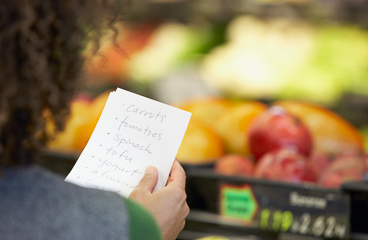
Overview
When you eat, the gallbladder releases bile, which helps you digest the fat in food. If you have an inflamed gallbladder, this may cause pain. A low-fat diet may give your gallbladder a rest so you can start to heal. Your doctor and dietitian can help you make an eating plan that does not irritate your digestive system. Always talk with your doctor or dietitian before you make changes in your diet.
Follow-up care is a key part of your treatment and safety. Be sure to make and go to all appointments, and call your doctor if you are having problems. It's also a good idea to know your test results and keep a list of the medicines you take.
How can you care for yourself at home?
- Eat many small meals and snacks each day instead of three large meals.
- Choose lean meats.
- Eat no more than 5 to 6½ ounces of meat a day.
- Cut off all fat you can see.
- Eat chicken and turkey without the skin.
- Many types of fish, such as salmon, lake trout, tuna, and herring, provide healthy omega-3 fat. But, avoid fish canned in oil, such as sardines in olive oil.
- Bake, broil, or grill meats, poultry, or fish instead of frying them in butter or fat.
- Drink or eat nonfat or low-fat milk, yogurt, cheese, or other milk products each day.
- Read the labels on cheeses, and choose those with less than 5 grams of fat an ounce.
- Try fat-free sour cream, cream cheese, or yogurt.
- Avoid cream soups and cream sauces on pasta.
- Eat low-fat ice cream, frozen yogurt, or sorbet. Avoid regular ice cream.
- Eat whole-grain cereals, breads, crackers, rice, or pasta. Avoid high-fat foods such as croissants, scones, biscuits, waffles, doughnuts, muffins, granola, and high-fat breads.
- Flavor your foods with herbs and spices (such as basil, tarragon, or mint), fat-free sauces, or lemon juice instead of butter. You can also use butter substitutes, fat-free mayonnaise, or fat-free dressing.
- Try applesauce, prune puree, or mashed bananas to replace some or all of the fat when you bake.
- Limit fats and oils, such as butter, margarine, mayonnaise, and salad dressing, to no more than 1 tablespoon a meal.
- Avoid high-fat foods, such as:
- Chocolate, whole milk, ice cream, and processed cheese.
- Fried or buttered foods.
- Sausage, salami, and bacon.
- Cinnamon rolls, cakes, pies, cookies, and other pastries.
- Prepared snack foods, such as potato chips, nut and granola bars, and mixed nuts.
- Coconut and avocado.
- Learn how to read food labels for serving sizes and ingredients. Fast-food and convenience-food meals often have lots of fat.
Current as of: October 7, 2025
Author: Ignite Healthwise, LLC Staff
Clinical Review Board
All Ignite Healthwise, LLC education is reviewed by a team that includes physicians, nurses, advanced practitioners, registered dieticians, and other healthcare professionals.

